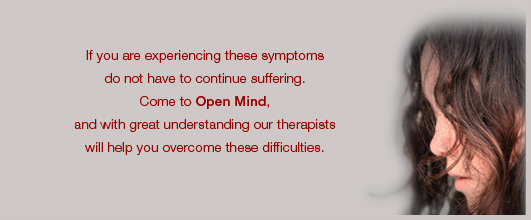Depression
Do you currently suffer, or have you recently suffered from, any of the following?
- Persistently sad or irritable mood
- Pronounced changes in sleep, appetite, and energy
- Difficulties thinking, concentrating, and remembering
- Physical slowing or agitation
- Present lack of interest in pleasure from activities that were once enjoyed
- Feelings of guilt, worthlessness, hopelessness, and emptiness, and recurrent thoughts of death or suicide
- Persistent physical symptoms that do not respond to treatment, such as headaches, digestive disorders, and chronic pain
If you answered YES to five or more of the above, you may very likely be suffering from depression.
These are symptoms of depression, and when you experience several of them at the same time, lasting longer than two weeks, and they interfere with your ordinary functioning, professional treatment is needed.
Depression is the most commonly treated mental health issue after anxiety, 1 in 6 Americans will experience clinical depression at some point in his or her life. By 2020, depression will be the second largest killer after heart disease. Going through life depressed, is like going through life with a chronic case of the flu—yet 80% of depressed individuals are not receiving treatment, and likely don't even realize they are depressed.

POSTPARTUM DEPRESSION
Postpartum depression (PPD), also called postnatal depression, can affect women after childbirth.
Symptoms of PPD can occur anytime in the first year postpartum and include, but are not limited to, the following:
- Sadness • Hopelessness
- Low self-esteem
- Guilt
- Sleep and eating disturbances
- Inability to be comforted
- Exhaustion
- Emptiness
- Inability to experience pleasure
- Social withdrawal
- Low or no energy
- Becoming easily frustrated
- Feeling inadequate in taking care of the baby
- Impaired speech and writing
- Spells of anger towards others
- Increased anxiety or panic attacks



